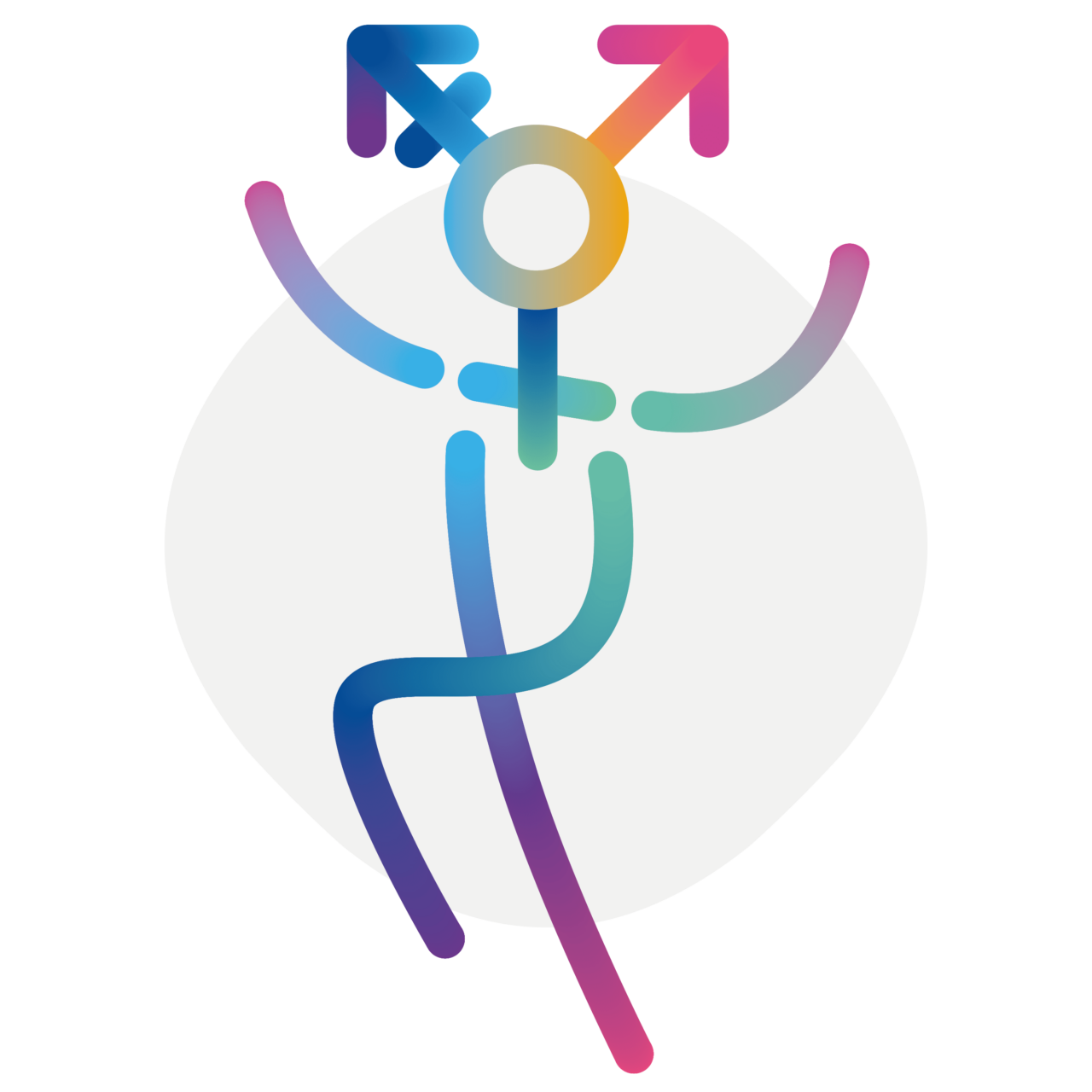Why
WELCOMING OUT?

You've probably already guessed it - WELCOMING OUT is about human diversity. More precisely, about gender and sexual diversity.
Before you drop out now because you think the topic doesn't concern you, please stay with us for a moment. Because that's exactly the point: It probably affects you more than you think. It's quite possible that you haven't been aware of it until now, because it has to do with stressful issues for others, such as fear, worry, devaluations, pretending and hiding, and others.
So if a person you like or even love is constantly living in worry or is consciously or unconsciously devalued by others, how good must it feel for that person if that were to end? And what a great feeling it would be for you if you could concretely contribute to this and possibly even see how this person suddenly blossoms?
Curious now? Then let's get started:
Why this topic might affect you more than you think.
You've probably heard of coming out before. But did you know that there is not just one coming out? You probably think of coming out as lgbtiq+ people telling others about their sexual orientation, gender identity or intersex. You are right and at the same time it is only one side of the coin.
Telling others about it is called the external coming out. If there is an external coming out, then logically there is also an internal coming out. The inner coming out describes the process in which people become aware of their sexual orientation or gender identity, or inwardly acknowledge the knowledge that they do not physically correspond to the usual ideas of man and woman.
And here comes the catch:
Sometimes it can be years. Depending on when a person has their inner coming out and how long it then takes for the outer coming out, people can come out at any age - whether in their childhood, in midlife or already retired.
For you, this means: You may know people who have already had their inner coming out, but have not told you about their sexual orientation, gender identity or intersex. Have you ever thought about this?
Not all lgbtiq+ people talk about it openly right away, and especially not to everyone. And not all people you think are straight, cisgender or endogender are actually. Can you imagine that there are people in your environment who are lgbtiq+ that you don't know about? And even if there were: Why does it take a coming out at all? Is that something that heterosexual, cis, endo-gender people do as well?
From here on you can choose which path you want to follow first: the sexual orientation path, the gender identity path or the intersex path.
Sexual Orientation

Of course, heterosexual people also have a coming out. However, as a rule, they only have an external coming out and not an internal one, because they conform to the social norm and are not expected to do otherwise. What would an inner, heterosexual coming out look like? When a boy falls in love with a girl or vice versa, it is exciting for the individual person, but socially no one is surprised.
It may be about the question, "Are my feelings reciprocated?" but not about the fact that it is a girl or a boy to whom I am attracted. That is simply clear in one's own perception without question. An external coming out, however, takes place very well and in addition still naturally. It's just that very few people perceive it as an external coming out.
Examples of a heterosexual coming out
Of course, a heterosexual coming out doesn't happen the way you might imagine a lgbtiq+ coming out, where someone says, "I'm lesbian/gay/bisexual/etc." The whole thing is much more subtle and casual.
Let's ask ourselves the question: What is a coming out?
Coming out means making your sexual orientation visible to other people. To do that, you don't even have to talk about it. It can be enough to walk through the city holding hands or to kiss in public.
It can also flow in quite naturally when talking about it. For example, when someone speaks as a woman about her husband and children or as a boy about his girlfriend. Most people don't see this form of heterosexual visibility as coming out and never have to deal with it because of their own heterosexuality. This is one of the reasons why coming out can be very difficult for many lgbtiq+ people.
Why coming out is important and hard at the same time for lgbtiq+ people?
The previously mentioned examples show how naturally a heterosexual coming out takes place, how everyday, casual and common it is. But now imagine that you were not heterosexual and did not want others to know that. You would have to hide a significant part of yourself in all this everydayness.
Imagine you are in a same-sex relationship and did something with your partner on the weekend. At work you are not outed and on Monday you are asked what you did on the weekend. What do you say?
You will experience such situations very often as a non-outed lgbtiq+ person. It's stressful because you always have to watch what you say so you don't give yourself away - possibly for years and everywhere. Possibly now you are wondering why anyone would do that instead of just saying something and ending the hiding game. That's a very good question.
The answer is that many people are simply too afraid of what might happen in the worst case scenario of coming out. They are afraid of losing important people in their lives; family members or friends, for example. They are afraid of problems at school, in their studies or at work. And the fact that they take on this game of hide-and-seek is a sign of how great these fears are.
Wouldn't outed lgbtiq+ people have to be afraid of a negative reaction if they tell you? If not, how can they be sure? Have you ever talked about it before? Can people see it in your face?
At WELCOMING OUT, we believe that many people would react well to you coming out to them as lgbtiq+.
We believe that most people have an open and accepting attitude. But only very few talk about it.
But that would be very important - especially because it's not written on anyone's forehead. And that's where WELCOMING OUT comes in.
Choose how to continue:
Gender identity

As soon as we are born, we are sorted into different gender drawers by our parents and doctors, midwives or obstetricians on the basis of our physical characteristics. Some are sorted into the female drawer and others into the male drawer. There is another drawer for inter*/intersex.
Many people grow up very satisfied with the assignment and find it coherent for themselves: Maybe you were assigned as a girl and feel like a woman in adulthood? You were labeled a boy since birth and have a male identity today? If so, you basically find yourself in the binary of female and male and agree with the gender that was recorded on your birth certificate. How nice! By the way, the technical term for this is "cisgender".
Maybe you are annoyed by societal expectations of being a woman or a man. Maybe you don't want to conform to certain stereotypes and you're sometimes more or less comfortable with that? We can understand that.
There are people for whom the gender registered for them at birth does not, not completely or not always match the gender identity they feel inside. This is called transgender or trans* - although there are many gender identities on a wide spectrum. Trans* people may feel (more) male or (more) female. Many feel neither male nor female. This is often referred to as non-binary gender identity.
Why can coming out be important and difficult at the same time for trans*, non-binary, or gender non-conforming people?
Gender plays a greater role in our everyday lives than we often assume. This is especially noticeable to people whose environment perceives them differently in terms of gender than they themselves feel.
Most people wish to be able to live authentically. They want to be able to show themselves to others around them as they really are.
If they can do this with you and not fear negative reactions, then you should have your WELCOMING OUT.
Choose how to continue:
Inter*

Perhaps you have noticed that for some time now, job advertisements in Germany have included the term (m/f/d) after the job title? You certainly know that m stands for male and w for female. The d stands for 'divers' - the third positive gender entry. What is often missing from m/f/d is the fourth possible gender entry. Already since 2013, the gender entry can be omitted when an inter* child is born. But what exactly does it mean when a person is inter* or intersex?
For some people, physical development does not happen the way we are used to. The combination of their internal and/or external sexual characteristics is a mixture of male and female. Sometimes medical professionals recognize this at the birth of the child because the newborn has unusual physical characteristics. Often, however, it is only later in life that it is recognized that a person is inter*, for example, when puberty proceeds differently than expected or a wish to have children remains unfulfilled. Being inter* is therefore something that you do not see in most cases.
The problem: When intersex is diagnosed, in most cases medical professionals immediately take measures to make the body of the person 'clearly male' or 'clearly female' - even though the people are completely healthy. This often happens even today, without the person concerned knowing exactly why an operation is being performed or why certain medications are being given.
Changes to the genitals immediately after birth are viewed particularly critically. After all, the babies cannot even consent to the procedures yet. Often their parents also consent to the operations because they do not receive complete information about what exactly all this means for the children.
What distinguishes Inter* from LGBTQ+?
Inter* is a collective term for all variations of gender development that do not correspond to the expectations of male or female development.
In some cases it is certainly useful to distinguish bodies on the basis of certain characteristics, for example in diagnosing a heart attack or the dosage of a drug. But in many cases, the division into two physical categories is not sufficient.
Why can coming out be important and difficult at the same time for inter* people?
Human bodies are as diverse as gender identities and sexual orientations. This also means that inter* people can be heterosexual, bi-sexual, or homosexual, for example; they can be cis, trans*, non-binary, or gender-nonconforming. For some inter* people, inter* is a gender self-location - just as men see themselves as male and women see themselves as female.
The reasons for coming out as inter* are the same as those for coming out as LGBTQ+: The person wants to live authentically and as the person they are. Sometimes people don't learn until many years later why they have had so many surgeries or have had to take medication since childhood. Others learn about their intersexness more by accident through medical examinations in adulthood.
Living openly as inter* can therefore additionally mean addressing the unconsented medical changes that still happen to inter* people.
The Solution:
WELCOMING OUT
 With WELCOMING OUT we have created a symbol with which you can send a message that is as simple as it is important:
With WELCOMING OUT we have created a symbol with which you can send a message that is as simple as it is important:
"I invite people in my environment who are not outed to have their coming out to me. I am signaling that they do not have to fear negative reactions, and I am inviting a dialogue.
I'm having my WELCOMING OUT."
You don't need a huge amount of expertise on lgbtiq+ topics. People who have their WELCOMING OUT open the door for a dialogue. We are convinced that if your counterpart comes out thanks to your WELCOMING OUT, you can learn a lot from the following conversations.
But one thing is incredibly important in any case: If it says WELCOMING OUT on it, it must also be WELCOMING OUT in it. Because with a WELCOMING OUT, not outed lgbtiq+ people are invited to confide in you. This trust is a gift and must not be abused under any circumstances.
Assuming your WELCOMING OUT is followed by a coming out, that doesn't mean you can't make mistakes. Making mistakes is okay as long as you keep three essential things in mind:
1. Appreciation and Respect
When you use WELCOMING OUT to invite others to come out, it can still happen that a coming out totally surprises you. There can be many reasons why you would never have expected it with individual people.
Nevertheless, no matter what you thought or did before, take a coming out seriously. Even if you don't understand or comprehend it at first, acknowledge and respect it.
2. Ask if you may ask
Whether coming out surprises you or not, you will probably have a lot of questions. This is absolutely understandable and will happen to the vast majority of people. And yet, not all questions are appropriate at all times. This can have different reasons: Maybe the questions are too personal or intimate. Maybe you could answer some of the questions yourself after a moment's thought; maybe your counterpart has had to answer the same questions a thousand times in previous coming outs; but maybe your questions are not a problem at all. You can't know, that's why: Ask if you may ask.
3. No third-party outing
A person has come out to you. Now you want to go out and tell more people because you know they will react positively too. That would make a lot of things easier, wouldn't it? And yet it's not a good idea! There might be good reasons against coming out that you don't know about.
And anyway: The decision when and how and to whom a coming out takes place is solely up to the person it concerns. The only exception is if you have explicit permission to tell others.
You've read this far? Congratulations! You now know the most important things to be well prepared for your WELCOMING OUT.
Now it's time for the concrete implementation: There are many possibilities for your WELCOMING OUT.
- You can pick up our free merchandise at many places in Hamburg. You can find an overview here.
- And of course you can also buy something in our online shop.
- If you think that WELCOMING OUT is a really good cause that you want to support, we are also happy about small and big donations. Feel free to spread the word.
We wish you all the best for your WELCOMING OUT and keep our fingers crossed that it will result in the good feeling mentioned at the beginning for you and for others.
It’s
your turn!
You want to support us, you want to read the important basics again or you want to order our free merchandise and have your own WELCOMING OUT? Then click on the respective button. Of course you can also write us a nice message.












